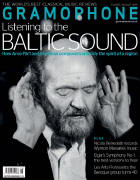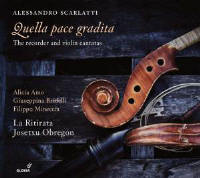Texte paru dans: / Appeared in: |
|
|
Outil de traduction (Très approximatif) |
|
|
Reviewer:
Tim Ashley Alessandro Scarlatti’s immense output includes a staggering number of chamber cantatas, nearly 800 in all, most of them for solo voice and continuo, though around 100 include obbligatos for additional instruments. Four of them, however, dating from around the turn of the 18th century, deploy the seemingly unusual combination of one or more recorders with either two violins, or violin and cello. They’re gathered together here by Josetxu Obregón and his ensemble La Ritirata, along with ‘Sconsolato rusignolo’, a stand-alone soprano aria, about which we know little, though it may be a fragment of another cantata, which has not survived complete. Stylistically, they’re pivotal in some respects, their concentrated amalgamation of recitative, arioso and aria peering back towards Cavalli, while the arias themselves deploy da capo forms that are less about ornamental display than terse immediacy of expression. The subject matter is predominantly pastoral, though Tu sei quella, che al nome jettisons rural trappings in favour of a direct depiction of a man’s anger at cruel treatment at the hands of an unnamed woman. The finest of the four is Quella pace gradita, an elegiac piece in which the protagonist bids farewell to love before seeking solitude among the beauties of nature: Scarlatti’s closely woven harmonies and his refined vocal writing sustain a mood of melancholy introspection here that proves deeply touching. he performances are excellent, though the disc is hampered by the decision to insert longish pauses between sinfonias, recitatives and arias that impedes each cantata’s dramatic flow. Obregón directs from the cello, and his players are keenly responsive. There’s real sensuality at the start of E perché non seguite, o pastorelle, with which the disc opens. The recorder solos are exquisitely shaped throughout by Tamar Lalo, while violinists Hiro Kurosaki and Pablo Prieto spin out the sorrowful opening of Quella pace gradita with great finesse. The singers are strong, too. Alicia Amo’s agile, silvery soprano is heard to advantage in Quella pace and ‘Sconsolato rusignolo’, while mezzo Giuseppina Bridelli sounds gracious and svelte in E perché, though she could perhaps do more with the text. Countertenor Filippo Mineccia, whose Scarlatti-singing on his ‘Siface’ album (7/18) gave such pleasure, tackles the greater drama of Tu sei quella and the grander, more insistent passions of Filen, mio caro with restrained intensity and warm liquidity of tone. Those pauses between numbers get in the way here a bit, though his singing is very fine indeed. |
|




